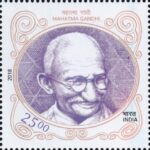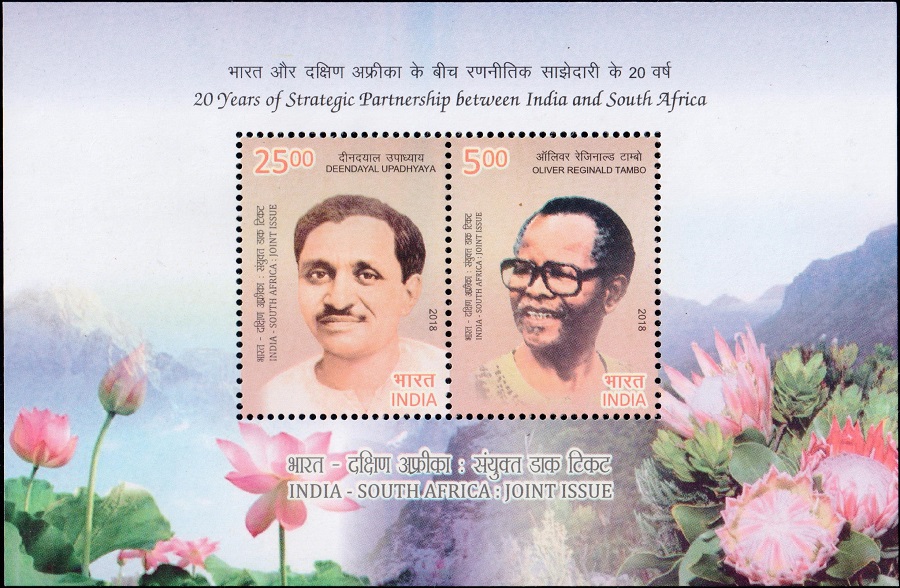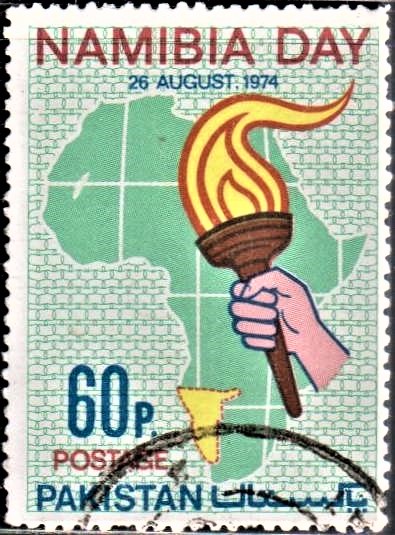
100 Years of Mahatma Gandhi’s Return
A Miniature Sheet consisting of 2 nos. of commemorative postage stamps on the Centenary of Mahatma Gandhi‘s Return to India from South Africa :



 Issued by India
Issued by India
Issued on Jan 8, 2015
Issued for : The Department of Posts joins the nation in celebrating 100 years of the Return of Mahatma Gandhi to India by releasing a set of two commemorative postage stamps.
Credits :
Stamp/FDC : Sankha Samanta
Cancellation : Alka Sharma
Type : Miniature Sheet, Mint Condition
Colour : Multi colour
Denomination : 2500 & 500 Paise
Stamps Printed : 0.9 Million each
Miniature Sheet : 0.5 Million
Printing Process : Wet Offset
Printer : Security Printing Press, Hyderabad
About :
- Mahatma Gandhi was a great man, a visionary, a person of extraordinary moral and physical courage. His identity as a political activist was an important prelude to his return to India, where he played a pivotal role in securing its independence from British rule. Mahatma Gandhi was the primary leader of India‘s independence movement and also the architect of a form of civil disobedience that would influence the world in the years to come.
- Gandhi arrived in South Africa in 1893 as a newly qualified lawyer, on a temporary assignment, to act on behalf of a local Indian trader in a commercial dispute. However, by the time he left South Africa for the last time in 1914, he had already earned the appellation, ‘Mahatma‘ (or Great Soul) for his work in securing significant legal concessions for the local Indian population in South Africa. For over a decade, he prepared numerous petitions and memoranda, led deputations to the authorities, wrote letters to the press and tried to promote public understanding and support – in South Africa, as well as in India and Britain – for the cause of the Indians in South Africa. His professional practice also came to be largely devoted to the same cause.
- During his time in South Africa, he also developed the strategy known as Satyagraha (truth-force), in which campaigners went on peaceful marches and presented themselves for arrest in protest against unjust laws. This passive resistance or Satyagraha was born and evolved in South Africa before coming to India and eventually, the world. This form of action became one of the greatest political tools of the 20th century. Satyagraha promoted non-violence and civil disobedience as the most appropriate methods for obtaining political and social goals.
- Gandhiji‘s stay in South Africa proved to be an important phase in his path to becoming a leading political figure of the 20th century. It was here that he developed his political views, ethics and leadership skills.
- On 9th January, 1915, Gandhiji returned to India, where he supported the Home Rule movement, and became leader of the Indian National Congress, advocating the policy of non-violent, non-cooperation to achieve independence. His goal was to help poor farmers and laborers protest oppressive taxation and discrimination, with the ultimate objective being self-rule for India. He was unique in his leadership style and his ability to draw the Indian masses into the freedom struggle.
- Text : Based on the information furnished by the proponent and the internet.








[…] 1915, Jairamdas came into personnel contact with Mahatma Gandhi, who had then returned from South Africa, and became his devoted follower. At the Amritsar Session of the Indian National […]
[…] his return from South Africa in 1915, Gandhiji established the Sabarmati Ashram in Gujarat. Then, on his […]
[…] the 150th anniversary of the first arrival of Indians in South Africa. 2014 marked 100 years of Gandhiji’s final departure to India from South Africa which date is commemorated annually as Pravasi Bhartiya […]
[…] of the first arrival of Indians in South Africa. The year 2014 marked 100 years of Gandhiji’s final departure to India from South Africa which date is commemorated annually as Pravasi Bhartiya […]
[…] marks a turning point. Rajkumar Shukla drew the attention of Mahatma Gandhi, who had just returned from South Africa, to the plight of the peasants suffering under an oppressive system established […]
[…] the request of Gopal Krishna Gokhale, he returned to India in 1915 and brought an international reputation as a leading Indian nationalist, theorist […]